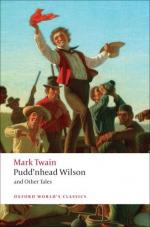Thereafter, during a stretch of two exhausting hours, he was busy saving Goodson’s life. He saved it in all kinds of difficult and perilous ways. In every case he got it saved satisfactorily up to a certain point; then, just as he was beginning to get well persuaded that it had really happened, a troublesome detail would turn up which made the whole thing impossible. As in the matter of drowning, for instance. In that case he had swum out and tugged Goodson ashore in an unconscious state with a great crowd looking on and applauding, but when he had got it all thought out and was just beginning to remember all about it, a whole swarm of disqualifying details arrived on the ground: the town would have known of the circumstance, Mary would have known of it, it would glare like a limelight in his own memory instead of being an inconspicuous service which he had possibly rendered “without knowing its full value.” And at this point he remembered that he couldn’t swim anyway.
Ah—there was a point which he had been overlooking from the start: it had to be a service which he had rendered “possibly without knowing the full value of it.” Why, really, that ought to be an easy hunt—much easier than those others. And sure enough, by-and-by he found it. Goodson, years and years ago, came near marrying a very sweet and pretty girl, named Nancy Hewitt, but in some way or other the match had been broken off; the girl died, Goodson remained a bachelor, and by-and-by became a soured one and a frank despiser of the human species. Soon after the girl’s death the village found out, or thought it had found out, that she carried a spoonful of negro blood in her veins. Richards worked at these details a good while, and in the end he thought he remembered things concerning them which must have gotten mislaid in his memory through long neglect. He seemed to dimly remember that it was he that found out about the negro blood; that it was he that told the village; that the village told Goodson where they got it; that he thus saved Goodson from marrying the tainted girl; that he had done him this great service “without knowing the full value of it,” in fact without knowing that he was doing it; but that Goodson knew the value of it, and what a narrow escape he had had, and so went to his grave grateful to his benefactor and wishing he had a fortune to leave him. It was all clear and simple, now, and the more he went over it the more luminous and certain it grew; and at last, when he nestled to sleep, satisfied and happy, he remembered the whole thing just as if it had been yesterday. In fact, he dimly remembered Goodson’s telling him his gratitude once. Meantime Mary had spent six thousand dollars on a new house for herself and a pair of slippers for her pastor, and then had fallen peacefully to rest.
That same Saturday evening the postman had delivered a letter to each of the other principal citizens—nineteen letters in all. No two of the envelopes were alike, and no two of the superscriptions were in the same hand, but the letters inside were just like each other in every detail but one. They were exact copies of the letter received by Richards—handwriting and all—and were all signed by Stephenson, but in place of Richards’s name each receiver’s own name appeared.




